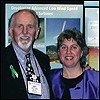Wind Power Advocate Interview: Rachel Shimshak, Renewable Northwest Project
July 1, 2004

Left: Larry Flowers, Wind Powering America with (right) Rachel Shimshak, Renewable Northwest Project, Portland, OR.
Location: Portland, OR
Rachel Shimshak, director of Renewable Northwest Project in Portland, Oregon, was recently awarded Wind Powering America's Regional Wind Advocacy Award for the Western Region.
Tell us a little about Renewable Northwest Project.
A. Renewable Northwest Project is a regional advocacy organization that promotes solar, wind, and geothermal in the four Northwestern states (Oregon, Washington, Idaho, and Montana). We are somewhat unique in that we have environmental and consumer groups working together with energy companies. The Center for Energy Efficiency and Renewable Technology (CEERT) pioneered this model in California, and it seemed like a good way to go.
Q. What are the strategic objectives of Renewable Northwest Project?
A. Our three strategic objectives are:
- Get good projects in the ground
- Promote policies that support renewables
- Grow the retain green market.
Tell us about some of your successful endeavors.
A. The Northwest is home to 680 megawatts of operating wind projects. Each state has small and large policies that promote renewables. We also have 35 green market programs offering renewable power to customers in the region.
Q. What are the remaining challenges in greening the Northwest?
A. The good news is that utilities around the region have active requests for proposals for 1500 megawatts of renewables right now. Our current challenge is to get them to follow through. My motto is, "Planning is good, doing is better."
Q. What can the federal sector do to help the effort to green the Northwest?
A. The federal sector, including the Bonneville Power Administration, can buy green power! We need reasonable transmission products and policies from them in order to accelerate renewables in the Northwest.
Q. If you could change one policy by decree, what would it be?
A. I would probably do something about carbon, because I think the polluting industries have gotten away far too long without internalizing that cost.
Q. What advice would you give other state or regional advocacy groups that are struggling to get renewables adopted?
A. You have to be patient and persistent.